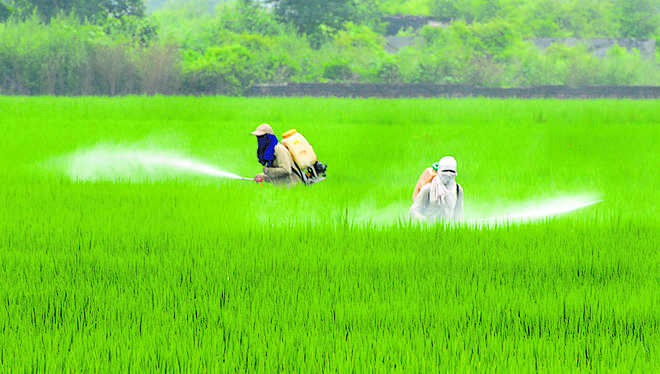
Back to nature: With soaring demand for safe food, mainline agriculture research has no option but to keep pace with the changing times.
Devinder Sharma
Food & Agriculture specialist
At a time when global temperatures are soaring, a study by a French think tank — Sustainable Development and International Relations (IDDRI) — has shown that agro-ecological farming has the potential to reduce greenhouse gas emissions in Europe by 47% and thereby keep the global temperature rise below 2°C. The study comes at a time when the UN's Food and Agricultural Organisation is already talking of green direct payments to organic farmers who opt for sustainable farming practices. At the Regional Symposium on Agro-ecology for Sustainable Agriculture and Food Systems for Europe and Central Asia-2016, one recommendation was to shift 30% of the European budget on agriculture to green direct payments. The study shows that agro-ecological farming will bring down pesticide consumption by 3.8 lakh tonne per year in European farming.
And yet, most climate mitigation studies point to more crop intensification, which will lead to freeing up larger proportion of cultivable lands and thereby claim to ensuring there is no drop in production. It is a push for a hyper-intensive farming system that leads to more toxic soils, more water mining sucking aquifers dry, and leading to more contamination of the food chain. This flawed assumption was essentially behind the launch of the New Vision for Agriculture at the World Economic Forum 2009, aiming at increasing production, decreasing greenhouse gas emissions per tonne, and reducing rural poverty by 20% each, every decade.
The 17 agribusiness giants that would spur the launch of New Vision includes Archer Daniels Midland, BASF, Bunge Limited, Cargill, Coca-Cola, DuPont, General Mills, Kraft Foods, Metro AG, Monsanto Company, Nestlé, PepsiCo, SABMiller, Syngenta, Unilever, Wal-Mart, and Yara International. In other words, it is more of the same leading to more catastrophic outcomes in the future.
The study provides hope at a time when the UN-sponsored TEEB initiative — Economics of Ecosystems and Biodiversity — for agriculture and food, has in its latest study, warned of a significant contribution to gas emissions emanating from farming practices. Accordingly, the entire farming systems, from cutting down of forests for making land available for cultivation to food waste dumped in landfills, account from 47 to 51% of global gas emissions. This factor alone plays a prominent role in the climate going topsy-turvy, which returns to haunt farming community reeling under the impact of climate change. The challenge is how to reduce the emissions, which becomes a surer form of mitigation for farmers from the chaotic implications from climate aberrations haunting them in the years to come.
What is of paramount importance is to bring in policies that help farmers transit to a more climate-resilient agriculture. In its earlier study, along with the UK-based Soil Association, the IDDRI has in a report entitled ‘Ten Years of Agro-ecology in Europe’ showed that it is possible to feed Europe a healthy, sustainable diet by transiting to natural farming systems. Earlier, an International Assessment for Agricultural Knowledge, Science and Technology for Development report, which was ratified (India included) during an intergovernmental plenary in Johannesburg in 2008, had warned that ‘business as usual’ is not the way forward.
Over the years, a consensus has developed around agro-ecology, which alone has the potential for an inclusive approach and the ability to reduce the damage being done to the planet. In India, a major initiative was launched when elders of Punukula village in Khammam district of undivided AP joined hands to stop the use of chemical pesticides. This was over 15 years ago. This initiative led to the introduction of non-pesticides management (NPM) under the Community Managed Sustainable Agriculture, expanding to 3.6 million acre without pesticides. After its bifurcation, Andhra Pradesh launched zero-budget natural farming (ZBNF) to bring its nearly 60 lakh farmers under the fold by 2024.
Surprisingly, there is no drop in productivity. Just a year after the introduction of ZBNF, a study by Azim Premji University showed that yields had gone up from 11 to 79%-11% in paddy and 79% in brinjal. Since wheat is not grown in South India, the impact on wheat yield can’t be known. But surely farming practices can be evolved that keep productivity on par. Punjab, ironically the country’s food bowl, imports a significant proportion of its wheat requirement. Much of the atta, considered to be free of chemicals, is imported from MP. Why can’t Punjab focus on organic wheat production?
This will require a paradigm shift in the way farm research is conducted. Crop varieties have been evolved based on their response to fertilisers and pesticides. It’s time to move to organic breeding, developing future varieties responding to organic manure, less water and needing no chemical pesticides. This has to be followed by reforms in markets, providing a higher price for organics and also providing for exclusive procurement of produce, coupled with policies that encourage farmers to make the transition. With soaring demand for safe food, mainline agriculture research has no option but to keep pace with the changing times.
As per Friends of Earth, in Europe alone, climate change has taken the lives of over 1.15 lakh people since 1980, causing a loss of 453 billion euros. In the global south, floods, drought, heatwaves and other extreme climate-related events/disasters result in hundreds of thousands of people dying every year. Instead of just blaming the weather gods, the time has come to reform farming systems, so as to move away from intensive cultivation that has denuded soils, mined groundwater and is leading to desertification.



























